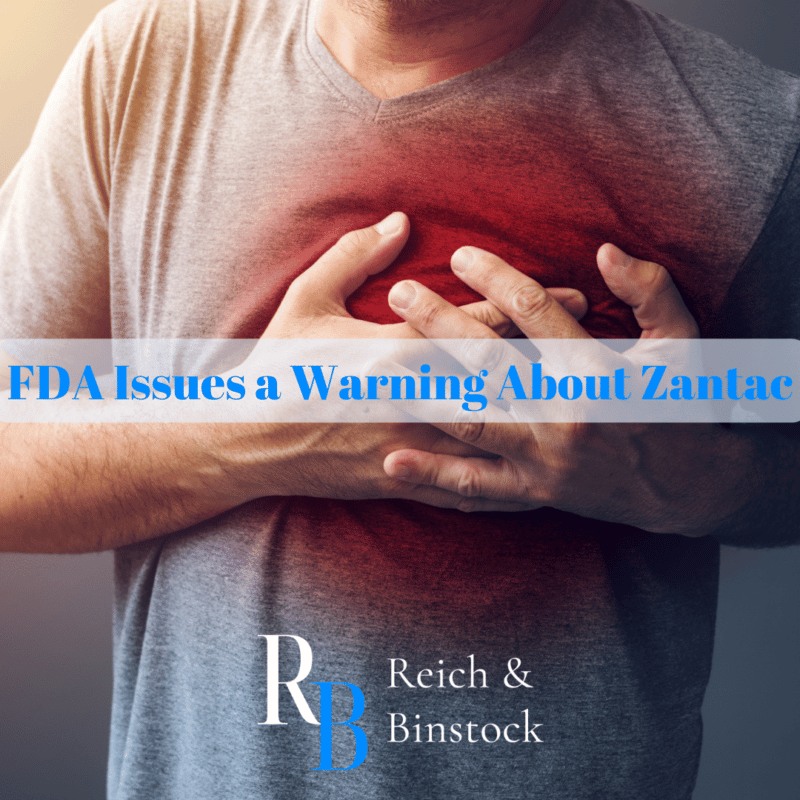HOUSTON ZANTAC LAWYER
MEDICAL DEVICE & PHARMACEUTICAL INJURY
Houston Zantac Cancer Lawyer

For decades, millions of people relied on taking Zantac and its generic counterpart, ranitidine. In addition to being sold as an over-the-counter alternative to prescription drugs for acid reflux, ranitidine was used to treat gastroesophageal reflux disease (GERD), stomach ulcers, mastocytosis, esophagitis, chronic heartburn, high stomach acid production, abdominal pain, and various other chronic diseases. However, the ongoing Zantac cancer lawsuits reveal the risks that the drug poses.
At the start of April 2020, the United States Food and Drug Administration (FDA) revealed that Zantac medication was both defective and dangerous for human use, issuing an immediate market recall of all ranitidine drugs. They advised that users stop taking Zantac and discard it. In 2019, routine lab testing showed that Pepcid and Zantac products contained traces of a probable human carcinogen, N-Nitrosodimethylamine (NDMA). In other words, NDMA is a cancer-causing chemical.
While low levels of NDMA exposure increase the human risk for cancer, there is now evidence that the NDMA in Zantac can also rise over time, potentially exceeding the acceptable daily intake limit under normal storage conditions and when broken down in the human body. This defect was originally only linked to batches of ranitidine that were manufactured for use between September 2019 and June 2021.
However, the FDA issued a warning to all consumers of ranitidine products to discontinue current use and dispose of remaining ranitidine products. This applies to all ranitidine medications, including ranitidine hydrochloride. If you were diagnosed with cancer after prolonged exposure to high levels of NDMA, we recommend speaking with a Zantac lawsuit lawyer as soon as possible.
Reich & Binstock’s Zantac Attorneys Taking Cases
At Reich & Binstock, our Zantac attorneys are standing by to represent those who developed cancer or other serious ailments from taking Zantac. If you or a loved one developed cancer after taking Zantac ranitidine tablets, you might have a case. We encourage you to speak with a Zantac lawsuit lawyer from our law firm as soon as possible.
We also encourage you to read our Zantac lawsuit FAQs listed below. This way, we can evaluate the facts of your case and establish a confidential attorney-client relationship with you. To schedule your free case evaluation, please call a Zantac lawyer from our law firm at 713-622-7271 today.
Health Issues Caused by Zantac Products
Our personal injury attorneys have extensive experience handling product liability lawsuits concerning defective drugs and medical devices. An experienced personal injury attorney with our legal team will hold drug makers accountable for their actions.
If you experienced the following health problems from brand name Zantac or other medications with ranitidine, you may be able to join the Zantac MDL or begin your own products liability litigation:
- Liver fibrosis
- High blood pressure
- Digestive tract issues
- Internal bleeding
- Various cancers
Zantac Lawsuit Update 2022

Many personal injury lawyers believe that 2022 will be a big year for Zantac litigation. In early June 2022, the Zantac lawsuit bellwether trials are close to the beginning. The discovery judge presiding over the Zantac trial recently granted a motion from the Zantac plaintiffs. This motion asks Sanofi and Chattem (the defendants) to allow plaintiffs from the Zantac multidistrict litigation to participate in the deposition.
The deposition involves an Information Technology employee. This employee is said to have first-hand experience and knowledge of Sanofi’s email deletion. The alleged deletions may contain important information related to the Zantac class-action lawsuit. Importantly, the presiding judge granted the plaintiffs’ motion. This will give MDL plaintiffs one hour of questioning at the first Zantac trial.
Zantac Information
What Is Zantac Used to Treat?
Zantac belongs to a group of drugs that works to reduce the acid produced by the stomach.
It can also treat the following gastrointestinal issues and related medical conditions:
- Heartburn
- Gastric (stomach) problems
- GERD
Because Zantac has undergone market withdrawal, many people are turning to other consumer products and heartburn medication. Examples include Prilosec, Nexium, Pepcid, Prevacid, and Tagamet.
What Are the Side Effects of Zantac?

Zantac is well tolerated by the majority of people, and its common adverse effects, such as headaches, diarrhea, and nausea, are moderate and only last a few days. Rarely, severe complications such as liver failure, acute porphyria, and pneumonia have been observed.
However, the US Food and Drug Administration asked that all ranitidine products be taken off the market in April 2020 due to concerns about contamination with NDMA, a cancer-causing substance.
Below, we list both the listed side effects of Zantac:
Listed Side Effects:
- Stomach pain
- Diarrhea
- Constipation
- Headache
- Drowsiness
- Fatigue
- Dizziness
- Insomnia
- Nausea
- Vomiting
- Rash
- Clay-colored stools
- Coughing up mucus
- Dark urine
- Easier bleeding and bruising
- Irregular heartbeat
- Loss of appetite
- Serious blistering, peeling, and red skin rashes with headaches
- Vision problems
- Weakness
- Yellowing of the eyes or skin
Zantac 360 with Famotidine Replaces Zantac OTC

Due to the FDA recall and the Zantac cancer link, patients who frequently used Zantac and ranitidine products needed a new way to treat heartburn, sour stomach, and peptic ulcers.
The original Zantac OTC is no longer available, nor are generic ranitidine products or any other generic versions of the product whatsoever. Sanofi released an alternative product for Zantac users, called Zantac 360. Instead of using ranitidine tablets or generic Zantac, which are dangerous drugs, patients can now use Zantac 360 with famotidine.
Famotidine is one of several acid-suppressive drugs on the market now. The Zantac cancer risk is what prompted Sanofi to develop this product and promote it in place of Zantac ranitidine products. Zantac 360 is not a prescription drug. Rather, it is an over-the-counter (OTC) medication.
The active ingredient in each tablet is famotidine USP 10 mg.
Side Effects of Famotidine
While side effects are not common, they include the following:
- Headaches
- Changes in mood
- Weakness
- Dizziness
- Fatigue
- Diarrhea
- Constipation
- Insomnia
- Muscle cramps or pain
- Joint pain
- Dry mouth
- Vomiting
- Nausea
What Is NDMA in Zantac?
N-nitrosodimethylamine (NDMA) is a probable human carcinogen according to the FDA and the World Health Organization. Carcinogens are substances capable of causing cancer in living tissue.
NDMA is actually a nitrosamine impurity that results from the formulation of the ranitidine molecule. Zantac patients took the name-brand drug and other ranitidine medications for decades. As we now know, Zantac use poses an unacceptable cancer risk to patients.
NDMA is a chemical that can be found in both natural and industrial processes. Zantac ranitidine tablets are deadly due to their carcinogenic ability to alter your DNA. DNA alteration can lead to a whole host of problems, including pancreatic cancer, primary pulmonary hypertension, and other serious health complications.
If you or a loved one has suffered adverse health effects from taking Zantac, we recommend speaking with a Zantac lawsuit lawyer from Reich and Binstock personal injury law firm as soon as possible. The defective drug lawyers at the law firm of Reich & Binstock are offering a free consultation to those affected by Zantac.
NDMA-Related Side Effects:
- Abdominal cramps
- Diarrhea
- Enlarged liver
- Fever
- Headaches
- Jaundice
- Nausea
- Reduced function of kidneys, liver, and lungs
- Vomiting
- Bladder cancer
- Stomach cancer
- Colon cancer
- Pancreatic cancer
- Prostate cancer
- Kidney cancer
- Liver cancer
- Breast cancer
- Gastric cancer
Zantac Class Action Lawsuit
Why Are Zantac Lawsuits Being Filed?
Thousands of plaintiffs have worked with trusted law firms and Zantac lawyers to file Zantac cancer claims. These lawsuits allege that non-prescription Zantac led to the development of cancer in plaintiffs due to high levels of NDMA exposure.
The evidence that the NDMA in Zantac causes cancer is almost overwhelming.
Our law firm is standing by to file a ranitidine lawsuit on your behalf. There have already been many Zantac cases filed. Schedule your free consultation with one of our Zantac lawsuit attorneys today.
Zantac Lawsuit Damages
Plaintiffs wish to seek compensation for their losses, including the following:
- Current and future medical bills
- Hospital and other medical costs
- Lost wages or lost income
- Loss of earning capacity
- Loss of consortium
- Pain and suffering
- Mental health issues
Can Zantac Cause Cancer?
While research is still relatively new, there is a possible risk of developing cancers with Zantac use. This is one of the main arguments that Zantac lawsuits allege. If you were diagnosed with cancer, a Zantac attorney with our firm can evaluate your individual case in order to determine whether or not you have a case. You may be able to work with a Zantac lawsuit lawyer to file a claim.
Many plaintiffs seeking a Zantac settlement have no family history of cancer. Their doctors suggest that their cancer came from an environmental source, such as Zantac. To schedule a free consultation with one of our Zantac attorneys at our law firm, please call 713-622-7271 today.
Which Cancers Are Named in Zantac Lawsuits?
The main types of cancer names in Zantac lawsuits include the following:
- Bladder cancer
- Prostate cancer
- Colon cancer
- Liver cancer
- Kidney cancer
- Breast cancer
- Stomach cancer
How Does a Zantac Lawsuit Lawyer Prove Zantac Cancer Cases?
It’s important to understand how our law firm will work to prove your case. You may be looking to seek compensation for your losses.
In order to be entitled to this compensation, your attorney must be able to prove the following:
- Prove that the NDMA in Zantac actually caused you harm in some way. This could be cancer, emotional anguish, loss of quality of life, or other losses.
- Prove that you actually suffered financial losses as a result of the NDMA exposure.
How Long Does It Take to File a Zantac Cancer Claim?
Many people wonder how long it will take to reach a Zantac settlement. As of now, it is difficult to estimate how long it will take to reach a settlement. Additionally, there is no guarantee that you will actually receive a settlement.
However, it may take several years before a global settlement is reached regarding Zantac. Speak with one of our personal injury attorneys about your case for a better estimation of your case’s timeline.
Who Actually Qualifies for the Zantac Lawsuit?

Proof of Use
To be eligible for a Zantac cancer lawsuit or settlement, you must first show that you used the drug. That implies you’ll have to prove you took Zantac (or another form of ranitidine). You may simply establish that you took prescription ranitidine by requesting a copy of your pharmacy records or medical records.
Proving that you took over-the-counter Zantac or another ranitidine product for an extended period of time is a little more difficult, but it can be done with receipts, notes in medical records, or even simple corroborating evidence or statements that support the fact that you took Zantac (ranitidine) on a regular basis.
Proof of Injury
Second, you must demonstrate an injury. That implies you’ll have to prove your cancer diagnosis with one or more of the main malignancies mentioned below. This can be simply demonstrated by requesting a copy of your medical records.
If you’ve developed any of the following cancers, you may be eligible for compensation:
- Stomach cancer
- Bladder cancer
- Breast cancer
- Liver cancer
- Kidney cancer
- Testicular cancer
- Uterine cancer
- Small intestine cancer
- Colorectal cancer
- Esophageal cancer
Proof of Causation
Third, and this is where things get a little tricky, you must have proof that your Zantac (ranitidine) use and cancer diagnosis are linked. The vast majority of the specialists we speak with insist on at least a year of significant exposure (you used Zantac on a regular basis for a year) and at least a year of latency (about a year passed between the time you first took Zantac and the time you developed one of the listed primary cancers).
Is There Time Limit to File a Zantac Lawsuit?
The statute of limitations for suing the medication makers for Zantac varies depending on where you live. Cancer victims in most jurisdictions have one or two years following their diagnosis to file a lawsuit.
The clock started ticking for patients diagnosed before the Zantac recall in 2019. Victims of Zantac should seek legal advice as soon as possible. In Texas, the statute of limitations is 2 years after the day that the injury occurred.
Filing a Zantac Wrongful Death Lawsuit

Some families have lost loved ones to cancer as a result of Zantac use. Family members of lost loved ones can file a wrongful death Zantac lawsuit to seek financial compensation. Qualifying relatives include children, parents, spouses, siblings, grandparents, and even grandchildren. If you lost a loved one to Zantac, we recommend speaking with a Zantac lawsuit attorney as soon as possible for a free consultation.
What is the Average Payout for Zantac Lawsuit?
For plaintiffs’ attorneys, the usual legal fee is 40% plus costs. (In mass tort lawsuits involving thousands of claimants, like Zantac, “expenses” are usually modest.) So, if a plaintiff receives a $100,000 compensation, he or she may anticipate earning around $60,000. (60 percent of the total). The details of the legal fee are spelled out in an attorney’s retainer agreement.
The Zantac cancer lawsuits will most likely be addressed through a worldwide settlement. The settlement levels for the Zantac case will very probably be dependent on the severity of the plaintiff’s injuries and the strength of the claim. Top-tier cases might be valued at more than $500,000. Second-tier lawsuits may cost up to $250,000. The cases in the lowest category will most likely be valued at $100,000 or less.
In a Zantac case, your reimbursement will be based on your damages or how much bodily harm and financial loss you incurred as a result of the medicine. Many medical malpractice claims are worth hundreds to tens of thousands of dollars, but you should speak with an attorney about the value of your Zantac cancer case to receive a personalized response.
Has Anyone Received a Settlement From Zantac?

Victims are eager to learn when the Zantac lawsuits will be resolved. A global settlement in the Zantac case is unlikely to materialize anytime soon. It takes a long time to resolve large mass tort lawsuits involving thousands of claimants. The case is currently in the consolidated discovery phase, with hundreds of additional plaintiffs joining every week.
The good news is that Zantac is no longer available. This makes quicker Zantac settlements possible.
What is the secret of Zantac’s widespread settlement? Bringing these NDMA cancer cases to a court of law. Plaintiffs’ attorneys have now taken a significant step in that direction by submitting a petition to remand several Zantac claims to state court. The sooner we get trial dates, the more likely we are to reach a global Zantac settlement. Settlement negotiations are likely to be heated.
What is the Latest on the Zantac Lawsuit?
The settlement of the Zantac cases is contingent on a number of conditions. The most pressing question is which cancers are connected to NDMA. Although research is rapidly advancing, not every disease will be firmly connected to NDMA, and some Zantac claims may be rejected as a result.
Our investigators have predicted that the first MDL class action proceedings for the Zantac claims will take place in late 2021 or early 2022.
The jury decisions in a handful of these cases will help determine the settlement payment amounts for both parties when they go to trial.
This should lead to a final class action settlement in the end. The length of time it takes to resolve the Zantac antacid cases is determined by how quickly we can schedule trial dates to put pressure on the defendants. Keep in mind that the first trial might start as late as the middle of 2022.
Is Zantac Safe Now in 2022?
Zantac has resurfaced in pharmacies as an over-the-counter medication. However, if you read the package carefully, you’ll see that the new Zantac 360 is not identical to the original. So, what’s the difference between the two?
Famotidine is the active component in Zantac 360, an oral tablet. It is accessible without a prescription and comes in two distinct dosages (10 mg and 20 mg). Adults and children over the age of 12 are the only ones who should take the over-the-counter pills.
Fortunately, Zantac 360 does not involve this risk of cancer. The FDA recommended that other H2 blockers be tested for NDMA after ranitidine was found to contain the carcinogen. They discovered that famotidine had no NDMA at all. There is no present worry about a possible relationship to cancer because it is devoid of this compound.
Zantac 360 is well tolerated, with the majority of patients experiencing no adverse effects after taking a dosage. In famotidine clinical trials, less than 1% of individuals complained of headaches, dizziness, or constipation. If you have any odd side effects after beginning this medicine, talk to your doctor about other options.
Had Issues With Zantac? Our Personal Injury Lawyers Can Help File A Claim
If you have experienced any changes in health after taking Zantac products, including being diagnosed with cancer, contact your physician and call the defective drug attorneys at the law firm of Reich & Binstock. We can help you file a Zantac claim and provide information about your right to recover damages for pain and suffering. If you suffered severe health problems from Zantac and ranitidine, we are here to offer legal services to help you file an individual lawsuit.
Please call our law firm in Houston at 713-622-7271 or fill out our contact form below for a free consultation. All information is confidential through an attorney client relationship.
Zantac manufacturers should be held accountable for the unacceptable levels of NDMA contamination in these acid control and acid reducer medications.
Our experienced attorneys are ready to hold the liable drug manufacturing company accountable for their actions. We have a proven track record in personal injury cases involving holding a large pharmaceutical company liable for their actions. Big pharma, drug manufacturers, and makers of other ranitidine products must answer for the cancer risks they posed to the public.
Our national law firm will work to gather sufficient evidence and necessary evidence to support your case.
This evidence may include the following:
- Records of when you purchased Zantac, in both prescription and generic Ranitidine form
- Notes from a medical professional about when you took Zantac
- Records of medical appointments
- Text messages about severe side effects
- Proof of user’s cancer diagnosis or another medical condition
- Expert testimony from medical experts
There is never a fee unless we recover on your behalf.














